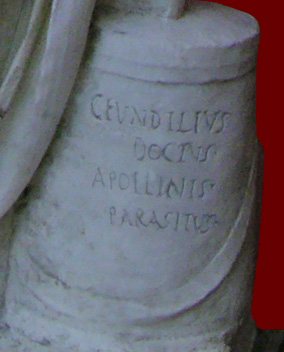

C[aius] FVNDILIVS
DOCTUS APOLLINIS
PARASITVS
Gaius Fundilius Doctus, “Parasite of Apollo” (CIL 14.4273; first century CE).
This inscription is carved on the capsa (a container for scrolls) at the feet of the statue; it is also repeated in larger letters on the base of the statue. Although the hands of the statue have been broken off, one of them had held a scroll, and the ribbon with which it had been tied is carved between the man's feet. Doctus, meaning “skilled” or “learned,” had been the slave name of this man; when he was manumitted, according to Roman custom he had taken the praenomen and nomen of the father of the woman who freed him, Fundilia Rufa. Parasiti Apollinis is the name of a famous and long-established guild (collegium) of mimes and pantomimes in Rome. This statue was placed in the sanctuary of Diana at Nemi, along with a statue of Fundilia dedicated to her as patron, a herm portrait of Fundilia with an inscription that lists her as patrona Docti, and several other herms including two mimes who were also members of the Parasiti Apollinis.